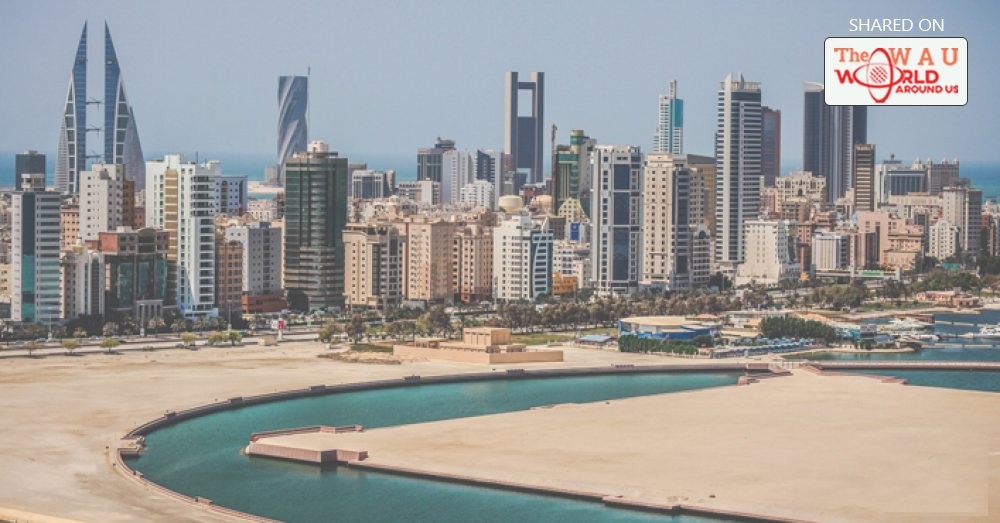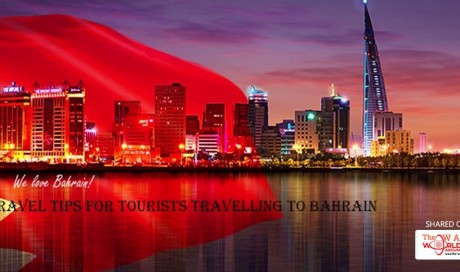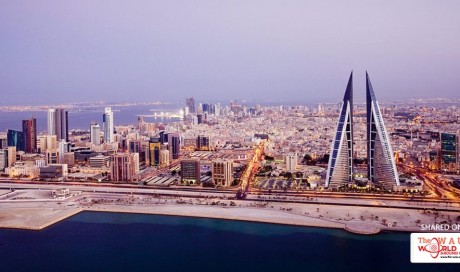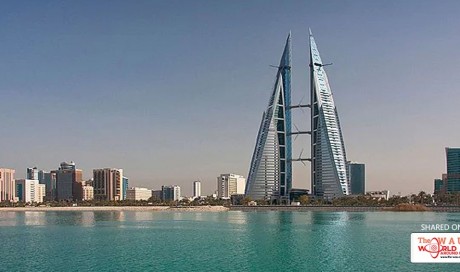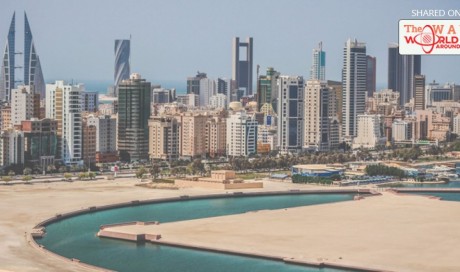State of Bahrain:
Bahrain, officially the Kingdom of Bahrain. A small Arab monarchy in the Persian Gulf, Bahrain consists of a group of islands between the Qatar peninsula and the north eastern coast of Saudi Arabia. It is an island country situated near the western shores of the Persian Gulf in the Middle East. It is a small archipelago centered on Bahrain Island, its largest land mass. It is just 23 km east of Saudi Arabia, connected to it through the King Fahd Causeway. The peninsula of Qatar is also nearby, about 50 km to the southeast across the Gulf of Bahrain. Iran lies 200 km to the north across the Persian Gulf.
Bahrain, which name means "two seas" was one of the first states in the Gulf to discover oil and to build a refinery.
It consists of a low desert plain rising gently to a low central escarpment with the highest point the 134 m. Bahrain had a total area of 665 sq km. But due to land reclamation, the area increased to 765 sq km.
Bahrain is the site of the ancient Dilmun civilisation. It has been famed since antiquity for its pearl fisheries, which were considered the best in the world into the 19th century. Bahrain was one of the earliest areas to convert to Islam. Following a period of Arab rule, Bahrain was occupied by the Portuguese in 1521, who in turn were expelled in 1602 by Shah Abbas I of the Safavid dynasty under the Persian Empire.
In the late 1800s, following successive treaties with the British, Bahrain became a protectorate of the United Kingdom. In 1971, Bahrain declared independence. Formerly a state, Bahrain was declared a Kingdom in 2002. In 2011, the country experienced protests inspired by the regional Arab Spring.
The first revolt and widespread uprising took place in March 1895 against Sheikh Issa bin Ali, then ruler of Bahrain. Sheikh Issa was the first of the Al Khalifa to rule without Persian relations. Sir Arnold Wilson, Britain's representative in the Persian Gulf and author of The Persian Gulf, arrived in Bahrain from Muscat at this time. The uprising developed further with some protesters killed by British forces.
Before the development of petroleum, the island was largely devoted to pearl fisheries and, as late as the 19th century, was considered to be the finest in the world. In 1903, German explorer, Hermann Burchardt, visited Bahrain and took many photographs of historical sites, including the old Qaṣr es-Sheikh, photos now stored at the Ethnological Museum of Berlin. Prior to the First World War, there were about 400 vessels hunting pearls and an annual export of more than £30,000.
In 1911, a group of Bahraini merchants demanded restrictions on the British influence in the country. The group's leaders were subsequently arrested and exiled to India. In 1923, the British introduced administrative reforms and replaced Sheikh Issa bin Ali with his son. Some clerical opponents and families such as al Dossari left or were exiled to Saudi Arabia and Iran. Three years later the British placed the country under the de facto ruler of Charles Belgrave who operated as an adviser to the ruler until 1957. Belgrave brought a number of reforms such as establishment of the country's first modern school in 1919, the Persian Gulf's first girls school in 1928 and the abolition of slavery in 1937. At the same time, the pearl diving industry developed at a rapid pace.
Economic and social development:
The Bahrain Petroleum Company (Bapco), a subsidiary of the Standard Oil Company of California (Socal), discovered oil in 1931 and production began the following year. This was to bring rapid modernisation to Bahrain. Relations with the United Kingdom became closer, as evidenced by the British Royal Navy moving its entire Middle Eastern command from Bushehr in Iran to Bahrain in 1935.
On 15 August 1971, Bahrain declared independence and signed a new treaty of friendship with the United Kingdom. Bahrain joined the United Nations and the Arab League later in the year. The oil boom of the 1970s benefited Bahrain greatly, although the subsequent downturn hurt the economy.
Bahrain had the first post-oil economy in the Persian Gulf. Since the late 20th century, Bahrain has invested in the banking and tourism sectors. Many large financial institutions have a presence in Manama, the country's capital.
According to a January 2006 report by the United Nations Economic and Social Commission for Western Asia, Bahrain has the fastest growing economy in the Arab world. Bahrain also has the freest economy in the Middle East and is twelfth freest overall in the world based on the 2011 Index of Economic Freedom published by the Heritage Foundation.
Bahrain has an open economy. The Bahraini currency is the second-highest-valued currency unit in the world. Since the late 20th century, Bahrain has heavily invested in the banking and tourism sectors. The country's capital, Manama is home to many large financial structures. Bahrain's finance industry is very successful. In 2008, Bahrain was named the world's fastest growing financial center by the City of London's Global Financial Centers Index. Bahrain's banking and financial services sector, particularly Islamic banking, have benefited from the regional boom driven by demand for oil. Petroleum production is Bahrain's most exported product, accounting for 60% of export receipts, 70% of government revenues, and 11% of GDP. Aluminium production is the second most exported product, followed by finance and construction materials.
According to the 2011 Index of Economic Freedom, Bahrain has the freest economy in the Middle East and North Africa region and is the tenth freest economy in the world. An alternative index, published by the Fraser Institute, puts Bahrain in 44th place tied with 7 other countries. Bahrain was recognized by the World Bank as a high income economy.
Location:
Bahrain is small country located in the Persian Gulf. It is considered a part of the Middle East and it is an archipelago that is made up of 33 islands. The largest island of Bahrain is Bahrain Island and as such it is where most of the country's population and economy is based. It consists of a low desert plain rising gently to a low central escarpment with the highest point the 134 m. Bahrain had a total area of 665 sq km. But due to land reclamation, the area increased to 765 sq km.
Topographic Features:
A narrow strip of land along the north coast of Bahrain is irrigated by natural springs and artesian wells. South of the cultivable area, the land is barren. The landscape consists of low rolling hills with numerous rocky cliffs and wadis. From the shoreline the surface rises gradually toward the center, where it drops into a basin surrounded by steep cliffs. Toward the center of the basin is Jabal ad-Dukhan, a rocky, steep-sided hill that rises to 122 m (400 ft). Most of the lesser islands are flat and sandy, while Nabih Salih is covered with date groves.
Land Area:
Bahrain had a total area of 665 sq km. But due to land reclamation, the area increased to 765 sq km.
Population:
As of 1 January 2016, the population of Bahrain was estimated to be 1 393 661 people. This is an increase of 1.76 % (24 077 people) compared to population of 1 369 584 the year before. In 2015 the natural increase was positive, as the number of births exceeded the number of deaths by 17 859. Due to external migration, the population increased by 6 218.
Capital City:
Manama
Official Language:
Arabic is the official language of Bahrain, but English is widely spoken. Among the non-Bahraini population, many people speak Farsi, the official language of Iran, or Urdu.
Climate:
Bahrain features an arid climate. Bahrain has two seasons: an extremely hot summer and a relatively mild winter. During the summer months, from April to October, afternoon temperatures average 40 °C (104 °F) and can reach 48 °C (118.4 °F) during June and July.
Major Towns:
Manama, Riffa, Muharraq, Hamad Town, A'ali, Isa Town, Sitra, Budaiya
Currency:
BHD - Bahraini Dinar, It is sub-divided into 1,000 fils. The Exchange parity has been set at the fixed rate of US $ =0.376BHD
National Day:
Although 15 August is the actual date on which Bahrain gained its independence from the British, the state does not celebrate or mark that date. Instead, the state annually celebrates 16 December as "National Day" to coincide with the day that former ruler Isa bin Salman Al Khalifa ascended to the throne.
Public Holidays:
July 08: Eid Al Fitr Holiday
September 12: Eid Al-Adha
October 02: Hijri new year
December 16: National day
National flag:
The national flag of Bahrain consists of a white band on the left, separated from a red area on the right by five triangles that serve as a serrated line.
Meaning of the flag:
A.The five white triangles symbolize the 5 pillars of Islam
B.The red side symbolizes the Khawarij sect of Islam.
Work Hours:
The working week in Bahrain tends to vary between 40 and 48 hours, depending on the particular company’s policy. Office hours are usually from 8.30 or 9.00 am to 5.30 or 6.00 pm. There are no differences in time keeping between summer and winter. In the month of Ramadan, the working day is reduced to six hours and legally this should apply to all staff, but many companies only apply it to Muslims, who fast during daylight hours.
Friday is the Muslim rest day and, if your company has a five-day working week, the other day off will probably be either Thursday or Saturday.
Local Time:
3hours+Greenwich Mean Time.
Electrical Current:
Electricity in Bahrain is 230 Volts, alternating at 50 cycles per second.
Public Transport System:
The public transport system in Bahrain is used by many. The two prominent forms of public transport include the bus and taxi. While many expats prefer to drive their own vehicles, many still use taxis to get about. There are a few different fares on taxis. There is a day fare, a night fare and an airport taxi available in Bahrain. The taxis all have a sticker with the fares outlined in the rear windows.
Busses are cheap and still largely used by migrant workers and day laborers who cannot afford a car or taxi. The busses are air conditioned and comfortable for travel and the bus routes can be accessed online.
Public transport: http://bahrainbus.bh/time-table/a1
Bahrain airways: http://en.bahrainair.net/
Sports:
A variety of sports in Bahrain are popular and widespread. Association football is the most popular sport in the country. Other traditionally-popular sports include basketball, volleyball and handball. Sports such as horse racing, and rugby union have gained popularity over the past few decades.
Bahrain Olympic committee: http://www.boc.bh/en
Bahrain football association: http://www.the-afc.com/member-association/bahrain-football-association
Telephone Code:
International code: +973
Area code: http://www.181.com.bh/
Share This Post

